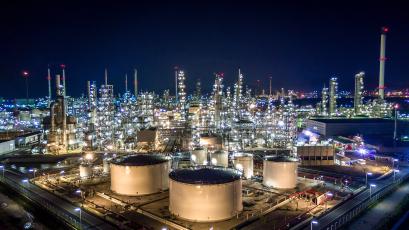An engineer scoops a handful of tiny pellets out of a stainless-steel canister at a manufacturing plant in the Netherlands and rolls them around in his hand. The BB-sized pellets made at Quality Circular Polymers (QCP) could hold the key to changing how the world thinks about plastics. Made of polymers repurposed from plastic waste, the pellets represent the successful reuse of thousands of bottles, bags, packaging and other materials that typically would be destined for the landfill.
Each year, consumers around the world throw away approximately 150 million tons of plastic — roughly half of all the plastic produced globally, according to researchers. Dealing with that waste has become a top priority for the plastics industry and its main supplier, the petrochemical industry, and their efforts are turning the traditional plastics manufacturing and recycling process on its head. As chemists, material scientists and engineers, they’re now applying their ingenuity to the plastic waste problem — turning the waste into a resource with promising results:
- Americas Styrenics, a Chevron Phillips Chemical Company joint venture, has partnered with Agilyx to convert waste polystyrene — currently deemed one of the least recyclable resins — back into the styrene monomer, which can then be used to make new polystyrene.
- SABIC last June became the first petrochemical company that announced plans to invest in a project to convert mixed plastic waste — which includes everything from bottles to film to grocery bags, products often difficult to recycle due to contamination with food and other wastes — into original feedstock. That plant, set to open in 2021, will also be in the Netherlands.
- And LyondellBasell partnered last year with SUEZ, a leader in advanced mechanical recycling, to form QCP in the Netherlands, which is developing recycled resins to compete in quality and price with resins from virgin material. It is also partnering with Karlsruhe Institute of Technology in Germany to test chemical, or molecular, recycling.
“Our view is that we are among the best polymer chemists in the world. We discovered a key family of catalysts that make high-density polyethylene many years ago. We have some of the strongest technical teams in the world. We are going to have to do something more creative,” said Jim Becker, vice president of polymers and sustainability for Chevron Phillips Chemical. “The combination of different types of recycling is going to be the answer. We think there is a home for all these products outside of landfills and plastics are too valuable to waste. They are really a resource for circular solutions.”
Their focus: Adapt years of chemistry and engineering to develop plastics that can be broken down and reused without compromising the properties that made plastics appealing and in high demand by customers in the first place.
Mechanical recycling has long been used to recycle plastics. But by simply shredding and melting post-consumer waste into new pellets, its scale is limited — the process weakens the plastic over time, and therefore restricts how much post-consumer recycled content can be put in a plastic bag or cup without compromising strength.
Another issue is many mechanically recycled products are brown or gray because it is hard to strip out the color. Petrochemical manufacturers have worked for years alongside their customers to tweak and perfect formulas for recycled and virgin plastics, but to create more products that contain primarily recycled material will require the adoption of chemical recycling.
“This is one of the technical problems in incorporating mechanically recycled post-consumer resin into these products,” Becker said. “How much can you put in before you really change the properties of the end product? Right now, you can’t put post-consumer resin in everything. It doesn’t work in all applications.”
Now, several companies are looking into chemical recycling — meaning the plastic is stripped down to its fundamental building blocks, or monomers, and then refashioned into polymers in the form of pellets, a process they can repeat several times without jeopardizing strength and quality. This is the Holy Grail of the circular economy for plastics.
“We certainly see chemical recycling as a very significant part of this whole puzzle,” Becker said. “In fact, long term, chemical recycling could become the solution we have been looking for to really having a circular, sustainable economy in terms of plastics.”
Anyone who regularly tosses their old milk bottles in a curbside recycling bin may assume their plastic underwent recycling for years, but the process isn’t as simple as it seems.
Different types of plastics require different processes, and the key is collecting a large volume of consistently high-quality material that’s clean and pure enough for recycling — difficult in many areas of the country where different types of recyclables are comingled. Food residue, glues or even a smattering of the wrong types of plastics may contaminate the resin, making it difficult to reuse.
The pellets developed by QCP have been engineered to address these concerns. The company is a joint venture between LyondellBasell, one of the world’s largest petrochemical manufacturers, and SUEZ, Europe’s second-largest waste company. Their cooperation is critical in developing recycled resin that can compete with virgin resin on both strength and price.
SABIC is taking a different approach by developing a system that can take the tainted plastic waste that currently gives recyclers headaches. Partnering with Plastic Energy, SABIC will be able to make TACOIL destined for its crackers from plastic trash, which would typically be headed for incinerators or landfills.
“When you start talking about plastic waste as a feedstock for your virgin materials, there is much more attraction with customers. The reason is very simple at the end of the day. People are very concerned about plastic waste,” said Frank Kuijpers, general manager sustainability for SABIC.
For this reason, the entire petrochemical industry is making plastics a priority.
“U.S. petrochemical producers are committed to the plastic waste issue and are at the forefront of addressing the problem,” said Chet Thompson, president and CEO of the American Fuel and Petrochemical Manufacturers. “They’re developing innovative products, investing in new and advanced recycling methods, and collaborating closely with other stakeholders in the plastics and recycling supply chains.”
Recycling not only diverts plastic waste from landfills, but a recent study by the Association of Plastics Recyclers found producing recycled resin also reduces emissions.
LyondellBasell and SUEZ created the QCP joint venture last year. The initial results have been encouraging. Jim Seward, LyondellBasell vice president of sustainability, believes the business model eventually can be applied to other markets, such as the U.S. and Asia. Ensuring a supply of quality post-consumer plastic waste is particularly critical in more fragmented waste collection markets. Based in the Netherlands, QCP hopes in the near future to double its initial capacity of about 25 kilotons of resin a year.
When the effort takes off, the program and others like it could broaden the role that plastics play in a sustainable future. “Plastics are an incredibly efficient resource and a versatile class of products,” Seward said. “We need to think about it in terms of circularity so that plastic does not become waste but rather is a raw material of feedstock for some other useful purpose. That is how we will solve the plastic waste challenge.”


